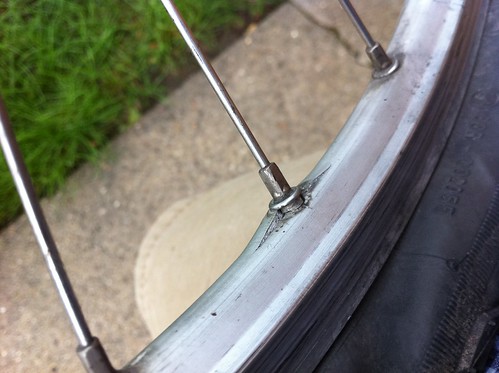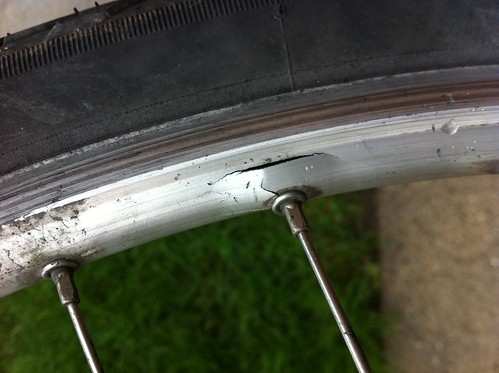Local wheel building?
Can anyone recommend a local LBS or mechanic who can build a good wheel? I have an old 26" wheel built around a Nexus 7-speed hub. The wheel just can't seem to hold true anymore after about 10 years of pretty hard use, but the hub is fine. I'd like to take the old wheel to someone and have them remove the hub and then build it into a new wheel, preferably something with 36 or more spokes so it will be bulletproof. (I'm a heavy guy and I ride this wheel daily w/loaded commuting panniers.) I'm tired of broken spokes every couple of months and having to get the wheel trued all the time. So, any suggestions?
Tags:
Replies to This Discussion
-
Permalink Reply by Michael A on July 30, 2011 at 6:59am
-
You cannot change the spoke count without changing the hub as well, but you can use a heavier guage spoke and nipple. What area you do you live in, there are many fine bike shops in our city, probably 2-3 close to where you live.
-
Permalink Reply by Kevin Mulcky on July 30, 2011 at 8:46am
-
If you get a heavy duty rim, intended for tandems or off-road, you shouldn't have a problem with only 32 spokes. Look into the Velocity Chukker or Synergy
-
Permalink Reply by Gopher Biker on July 30, 2011 at 9:33am
-
The Pony Shop in Evanston have an extremely friendly staff and build very nice wheels.
-
Permalink Reply by Far'arned Retrogrumpalunkus #63 on July 30, 2011 at 10:30am
-
Going with a heavier-gauge spoke doesn't necessarily mean a stronger wheel. It's complicated...
Heavier-gauge spokes require HIGHER tension to support the same amount of weight and have the same strength. More tension means more stress on the rim and an even stronger rim is required. With a 32-spoke wheel that is even MORE stress on the rim as the spokes are spread further out on the rim than a 36 or 40-spoke wheel. To go with a heavier-gauge spoke it will be necessary to get a much higher-end rim that can handle the stress. That equals quite a bit more $$$ outlay.
It probably would just be better to go with a lower-gauge butted spoke and keep a much better eye on the tension of the spokes. A hand-built wheel will have a much more even spoke tension around the wheel and be stronger and be able to hold its tension better over time.
I agree that a <36-spoke wheel is asinine in a city commuter bike. But the simple fact is that the hub is drilled for the number of spokes you can use and that can not be changed. It might be possible and cheaper to get a new hub shell from Shimano for the Nexus-7 with a 36 or 40 hole flanges -or maybe even find one used with a blown inside that you can scavenge before building a new wheel. But the rim will also need to be changed as well because the spoke drilling is what it is in your 32-spoke rim.
That said, a properly built 32-hole wheel with butted spokes by a good builder should last you another good 10 years of riding if it is taken care of and spoke tension is not allowed to drop. Low tension will kill the spokes much faster than normal and increase the fatigue cycle many-fold.
10 years of hard use isn't bad for any wheel if you ask me. About the only way one is going to get more than that is to go with a 40-spoke rear and even those are not beyond wear. I wouldn't be too hard on this wheel if you got 10 years of hard use out of it I think it doesn't owe you much more than that. Bike wheels don't last forever. You didn't do too bad.
-
Permalink Reply by Bill W. on July 31, 2011 at 1:59am
-
licktons in oak park has a great wheel builder. I have a set that I rode for 16 years (Mavic Open sport + Phil Wood). I had the rear wheel/rim replaced in 2009 because a spoke pulled from the rim's eyelet. The front wheel has well over 25k on it and the rear had upwards of 20k. (I replaced front/back sealed bearings in 2010.) I've had another set built for my "town'y" bike (Mavic open sport + surly ) and they've been solid thus far. I've ridden both sets of wheels pretty hard (messenger and touring and commuting) and quality has never been an issue.
-
Permalink Reply by ambimb on July 31, 2011 at 3:59am
-
Thanks everyone. From the little I know and what I've read (including BlackHeron's very informative post above), wheel building seems like almost the most technical and esoteric part of bike repair or building. Based on that, it seems to me that even a great LBS might not have anyone who is really great at building wheels. Maybe good wheel builders are more common than I thought. At any rate, I'll check out your suggestions. So far the Velocity Chukker rims look like exactly what I'm looking for. The hub I have is drilled for 36 spokes so with a stronger rim and a good builder, I'll just have to hope that's good enough. I'll have to let the wheel builder figure out all the crazy math regarding spoke length, weight, and tension...
-
Permalink Reply by Far'arned Retrogrumpalunkus #63 on July 31, 2011 at 4:52am
-
Wheelbuilding isn't as difficult as many seem to like to make it. It's not voodoo and it's not really all that complicated or technical. It definitely isn't a black art.
Sheldon Brown wrote up a fairly complete informational page about wheelbuilding and I feel any reasonably competent home mechanic could do the task after a little bit of help with some of the decision-making processes before and during the build.
The calculations are not difficult at all as the math is all done by programs or macros such as spocalc. The real difficulty comes in knowing what to measure, how to measure it correctly, and which fields to plug those numbers into within the spoke calculator program itself.
The confusion lies in the fact that just about every rim is going to have a different ERD, even among rims of the same size, depending on the manufacturer. Even rims made by the same manufacturer and with the same model name/number might vary in ERD over model year to model year! That's crazy. knowing how to measure ERD is the most important step IMHO although many people sort of wing this when building wheels and hope for the best. Spokes aren't cheap though, and buying another set because you misjudged and your spokes are all 3mm too short kind of sucks.
I've got a good online source that brings down my price to about $20/wheel which is much better than paying $1+/each at an LBS. Spending $72 (plus tax) on just the spokes for a pair of wheels sure makes the idea of building your own wheels a bit uneconomical huh?
With a cheap plastic caliper and a couple of spokes of known length it isn't hard at all to measure the ERD over 4-6 areas of the rim and average them just in case the raw rim you are using is a tiny bit ovalized.
Another tricky area is understanding dish and how to measure the distances from the flanges to the center of the hub. After one learns to measure and understand these dimensions the rest of the calculations are done by the program You just have to decide what number of crosses you are going to use. That's another thing that some people might need help deciding on.
I saw a decent vernier caliper the other day at American Science & Surplus that is of good enough accuracy to do this job and it was only $2! A halfway decent caliper is about the only thing needed to measure a hub and rim for spoke calculations if one knows the technique. It can be done with a good metal ruler with a mm scale if one has a really good eye. Measuring the hub is much easier with a caliper. Every home bike mech should have a caliper IMHO. For $2 why not?
The only other necessary tools are a good spoke wrench or wrenches as the nipples can be all different sizes (especially on a used wheel where some could have been replaced over time) and a wheel-building stand. I've built wheels in the past on the frame or on an old fork stuck in a vise. It can be done. But even a cheap stand like this one for about $50 makes the job much easier.
One final tool that takes a lot of the guess work out of wheel building, when it comes to proper spoke tension, is a spoke tensionometer gauge/tool. It isn't 100% necessary to build a wheel that works, but a wheel that has even and correct tension all around the circumference will last a whole lot longer and stay true better over its lifetime.
Not a black art, nor overly technical IMHO.
The lacing itself isn't hard at all either -nothing at all like the complex weaving my wife does when she is putting cabling into her knitting projects. It's not even as hard as regular knitting something simple like an ordinary scarf. It's just a simple pattern. If one can knit the actual lacing part of wheelbuilding will seem ridiculously simple once one sees it done in front of you and the pattern is grasped. It's difficult to explain on paper -but once it is demonstrated it's nothing at all.
-
Permalink Reply by Will on July 31, 2011 at 5:25am
-
I'd recommend Marcus at Yojimbo's Garage. He built a great set of wheels for my LeMond, and I get the feeling he builds a lot of wheels.
-
Permalink Reply by Doug Haynes on July 31, 2011 at 12:20pm
-
any shop can do it for you.
-
Permalink Reply by Far'arned Retrogrumpalunkus #63 on July 31, 2011 at 1:16pm
-
Permalink Reply by ambimb on August 14, 2011 at 1:25am
-
When I originally posted I just thought the wheel had gone out of true again, but I stopped riding it and switched to my B bike until I figured out what to do about it. Only yesterday I looked closely at this wheel I'm replacing and learned just how "blown" it really was:
And:
I never imagined it was so bad! I had a spoke replaced only about a month before I stopped riding it so this damage must have occurred after that. There are also smaller cracks beginning around a bunch of other spoke nipples. I think this wheel is pretty well worn out.
I took it Licktons and should have a shiny new Velocity Aeroheat wheel sometime next week.
-
Permalink Reply by Far'arned Retrogrumpalunkus #63 on August 14, 2011 at 5:50am
-
Yeah, I think you pretty much got all you are going to get out of that wheel.
Groups
-
Chicagoland Beer Explora…
203 members
-
Wednesday Night for Mort…
1 member
-
Great Lakes Ultra Cycling
270 members
-
Major Taylor Internation…
1 member
-
Critical Mass discussion
261 members


